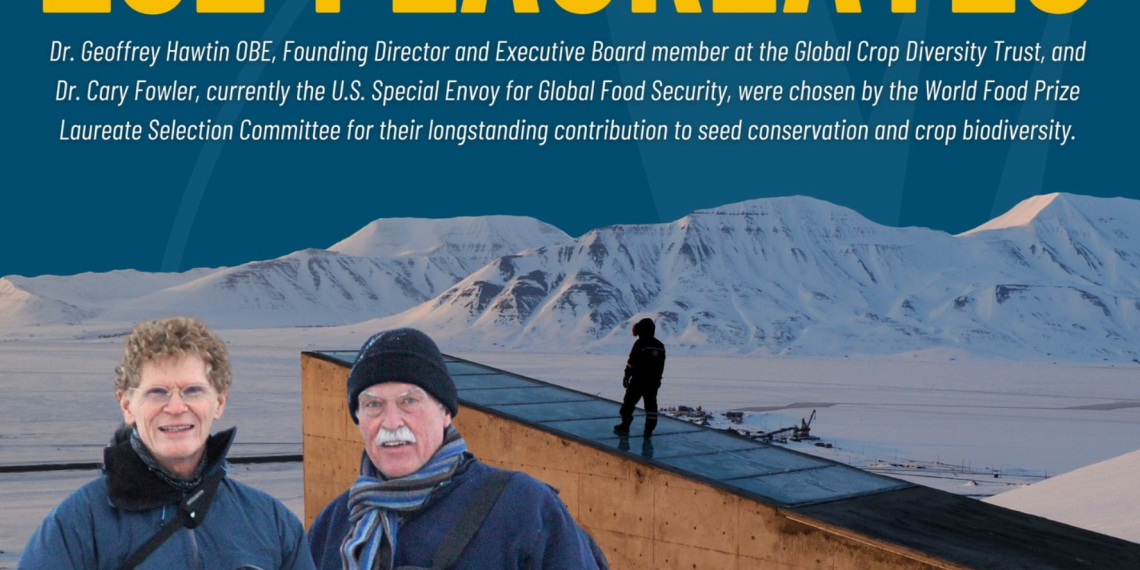Two scientists, Geoffrey Hawtin and Cary Fowler named 2024 World Food Prize Laureates
Two Scientists Awarded 2024 World Food Prize Laureates for Outstanding Contributions to Food Security and Agriculture
The World Food Prize Foundation (WFPF) has named two scientists, Geoffrey Hawtin and Cary Fowler, as the 2024 World Food Prize Laureates.
Both scientists were instrumental in creating a back-up vault of the world’s crop seeds to protect global food security.
According to a statement published on Thursday, the two scientists were announced by WFPF’s president, Terry Branstad, at a ceremony in the United States of America. The event was hosted and presided over by the US Secretary of State, Antony Blinken.
“The World Food Prize is bestowed to individuals for recognition of their achievements in the fight against hunger and food insecurity – one of the most pressing issues of our time,” the statement quoted Mr Blinken as saying.
The official said the awardees, Messrs Hawtin and Fowler, have made extraordinary contributions towards this cause and both have done critical work to advance global crop biodiversity, conserving over 6,000 varieties of crops and culturally important plants which has had a direct impact in addressing hunger around the world.
The organisers noted that this year’s awardees were chosen by the World Food Prize Laureate Selection Committee for their longstanding contribution to seed conservation and crop biodiversity.
“This is the 20th year the Department of State has played a role in this announcement and we are honoured to be able to support the World Food Prize Foundation’s recognition of Dr. Fowler’s and Dr. Hawtin’s work,” Mr Blinken said.
The World Food Prize
The World Food Prize is an international award that honours individuals who have improved the quality, quantity or availability of food worldwide.
The prize was founded by Norman Borlaug, recipient of the 1970 Nobel Peace Prize, for his work that contributed to increases in agricultural outputs which was termed the Green Revolution.
Since then, the foundation said, the prize has been awarded to 53 distinguished individuals during the Norman Borlaug International Dialogue. The Dialogue, also known as the Borlaug Dialogue, is a week of events dedicated to an issue surrounding food insecurity or hunger each year.
According to the statement, this year’s awardees will share a $500,000 cash prize award for their work to preserve the world’s heritage of seeds.
It said both men played key roles in establishing the “Svalbard Global Seed Vault”, which today holds 1.25 million seed samples of more than 6,000 plant species in an underground facility in the Arctic Circle.
The repository, often referred to as the “Doomsday Vault,” opened in 2008 and stands as the last line of defence against threats to global food security, including pandemics and climate catastrophes, the organisers noted.
Comments
In his remarks, Gebisa Ejeta, chair, World Food Prize Laureate Selection Committee, said the awardees (Hawtin and Fowler), realised early in their careers the immense value and heritage of our crop genetic resources.
“In choosing these two visionaries, the Selection Committee recognized the importance of this long-term thinking and planning for facing climate change and other existential threats, and for the example it sets and the wisdom it imparts in all of us on how we may collectively mobilise the equitable use of the rest of our global endowments to ensure food security for all,” Mr Ejeta said.
On Thursday, the WFPF said Messrs Fowler and Hawtin have played pivotal roles in the development of the International Treaty on Plant Genetic Resources for Food and Agriculture, or Plant Treaty, which was adopted in 2001, to facilitate the global movement of plant genetic resources.
By codifying international agreements and mechanisms for the sharing of seeds, the treaty laid the foundations for the Svalbard seed vault, the WFPF said.
“The vault was the brainchild of Dr. Fowler, who wrote to Norway’s Ministry of Foreign Affairs to ask them to consider establishing such a facility during his time at CGIAR, the world’s largest publicly funded agricultural research organisation,” the statement said.
Mr Fowler, who began his career in 1978 as programme director at the National Sharecroppers Fund in North Carolina, was quoted to have said, “While creating a global seed vault might seem logical now, people told me at the time that the idea was crazy.
“We’ve since managed to collect and preserve the diversity of all of the major crops, including, for example, 150,000 types of wheat now in storage. But we need more collections, particularly of indigenous crops from regions such as Africa, because the diversity of these hardy crops is the raw material for plant breeding improvements.”
“I’m hoping the World Food Prize will inspire investments in this kind of transformational R&D which is going to be necessary for food and nutrition security for 10 billion people by 2050,” he added.
Mr Hawtin spent much of his early career and risked his life collecting, preserving and protecting species of legumes such as chickpeas and faba beans from Afghanistan, Ethiopia, Lebanon, Jordan, Syria and Turkey.
These collections, according to the statement, helped to establish the genbank managed by the International Centre for Agricultural Research in the Dry Areas (ICARDA). When civil war broke out in 1975, he was responsible for moving collections of plant genetic material six times, across a mined road and under weapons fire, from Lebanon to Syria.
Also Read: World of Statistics ranks countries by cost of living (Full list)
Mr Hawtin, a former Director General of the International Plant Genetic Resources Institute (IPGRI), now part of the Alliance of Bioversity International and CIAT, said: “The genetic diversity of crops and their relatives is as important to biodiversity as it is to food security, and much of it is as endangered as pandas and rhinos.”
In receiving this honour, Mr Hawtin said he would like to make a call to arms for urgent and sustained funding for the more than 1,700 genebanks around the world that are working tirelessly to make sure the material that farmers and plant breeders need is conserved and remains available.













